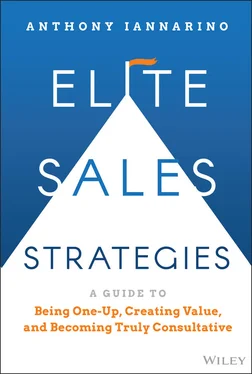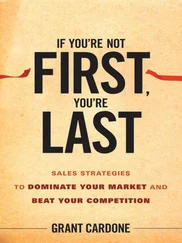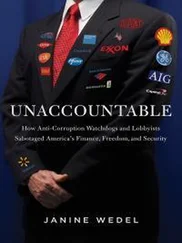Anthony Iannarino - Elite Sales Strategies
Здесь есть возможность читать онлайн «Anthony Iannarino - Elite Sales Strategies» — ознакомительный отрывок электронной книги совершенно бесплатно, а после прочтения отрывка купить полную версию. В некоторых случаях можно слушать аудио, скачать через торрент в формате fb2 и присутствует краткое содержание. Жанр: marketing, на английском языке. Описание произведения, (предисловие) а так же отзывы посетителей доступны на портале библиотеки ЛибКат.
- Название:Elite Sales Strategies
- Автор:
- Жанр:
- Год:неизвестен
- ISBN:нет данных
- Рейтинг книги:4 / 5. Голосов: 1
-
Избранное:Добавить в избранное
- Отзывы:
-
Ваша оценка:
- 80
- 1
- 2
- 3
- 4
- 5
Elite Sales Strategies: краткое содержание, описание и аннотация
Предлагаем к чтению аннотацию, описание, краткое содержание или предисловие (зависит от того, что написал сам автор книги «Elite Sales Strategies»). Если вы не нашли необходимую информацию о книге — напишите в комментариях, мы постараемся отыскать её.
Elite Sales Strategies
Elite Sales Strategies
Elite Sales Strategies — читать онлайн ознакомительный отрывок
Ниже представлен текст книги, разбитый по страницам. Система сохранения места последней прочитанной страницы, позволяет с удобством читать онлайн бесплатно книгу «Elite Sales Strategies», без необходимости каждый раз заново искать на чём Вы остановились. Поставьте закладку, и сможете в любой момент перейти на страницу, на которой закончили чтение.
Интервал:
Закладка:
The greatest risk to your success with this approach is to believe that you can learn nothing from your client to understand how best to serve them—and your future clients. A large factor that makes you One-Up is how much you have learned from your clients. Those who wish to teach should start by committing to learn. You must recognize when you need to be One-Up, as well as when you are—and need to be—One-Down. You better occupy the space of One-Up by descending to the One-Down position when someone else is One-Up and can help you see something that was unavailable to you. You are going to need to become an expert to maintain the One-Up position where you know more than your clients. Your client is in the One-Up position when they are sharing with you how things work in their company. In this case, your One-Down position allows you to take in new information that will be critically important to you later, when you find yourself One-Up again.
The Virtuous Circle of Increasing One-Upness
You are an expert in what you sell, and if you are not, I hope you are on your way to becoming one; it will change your results and your life. Your client is an expert in their industry and their role, meaning they are One-Up in those areas. By providing your client with the insights and information they are lacking as it pertains to the better results they need, you help them become One-Up—not over you, but over others who know less. The same is true for you. When your client helps you understand their business, their industry, their overall strategy, and a dozen other topics that close the gaps in your knowledge and experience, you are less One-Down and more One-Up, even if you lack the expertise of someone who spent their life in their industry. You know more than you did, and it's likely you know more than someone who isn't trying not to be perpetually One-Down.
There is no reason that you should worry about teaching your client what they need to know to be One-Up. They are not likely to surpass your One-Upness because they will not be able to acquire your experience selling what you sell. Your experience is deeper and wider than your clients who make a given buying decision once every few years at most. You help clients and prospects make those decisions every day. If you sell in different verticals, you know things that other people don't because you spend time learning from your contacts, but you recognize that you lack the expertise of your clients in their industry.
How Being One-Down Makes You One-Up
One of the ways you improve your ability to be One-Up is by being One-Down when you need to be. In one of my first jobs as a field salesperson, I called on large distribution centers in my territory of Columbus, Ohio. It was a target-rich environment, and I had homed in on a number of very large prospects, each one spending millions of dollars with companies in my industry. Having won one of the largest retail distribution centers in the city, I was learning how best to take care of their needs. My main client was a seasoned veteran of the business, and he invited me to sit in on his planning meeting, an indication that he favored me over my competitors.
The conversation I was listening to was in a language I didn't speak. First, the managers and leaders used a lot of acronyms that made no sense to my ears. Second, they used lot of jargon. While I didn't yet have the concept of being One-Down, I felt it. I was lost. When I left the meeting, I asked my main contact to help me make sense of what I heard, especially the term throughput . It's not difficult to guess the meaning of the word, but for this group, it was a math equation. He patiently explained to me that the throughput was a calculation based on how much product they shipped divided by the cost of their labor. They had goals around throughput. He showed me how they kept score on a spreadsheet. A few weeks later, I walked into a different prospective client's distribution center and asked my main contact what their throughput numbers were like during their peak season. He was stunned by the question, as no one else in my role would have known to ask. There is no way I was One-Up when it came to running a distribution center, but I was One-Up on any and all of my competitors. Without knowing that I was being taught to be One-Up, I was gaining a competitive advantage by asking my client to educate me about their business, correcting my One-Downness.
Learning From Your One-Up Client
There are many things you need to know to successfully help your client change and produce the outcomes they need to be successful. But at least in these three areas, you need your client to help you understand what you need to know and how to use that knowledge to help them succeed.
Their IndustryUnless you have worked in your prospective client's industry, your client is certain to know more about their industry than you. What you want to be is an expert on the line where your industry and your client's industry come together. You are already an expert in your industry, and you understand what's on your side of that line. Because your client is an expert in their industry, they have the knowledge and experience to be able to help you understand their side. Every interaction with a stakeholder provides you with an opportunity to be tutored by experts in a specific industry. When your contacts tell you how their business works, how challenges show up in their world, and what the optimal change might look like for them, you have gained information that allows you to be better prepared for future conversations with other clients or prospects. In a conversation with a new prospect, you are starting out less One-Down than you might have been had you not learned from your previous clients.
What's even better is discovering that some companies have beliefs and ideas that conflict with other companies in the same industry. When you are aware that some approach works in some scenarios and fails under different circumstances, you have situational knowledge to understand what works, when it works, and what conditions need to be present for something to be true. Every industry has a number of things that differentiate it from other industries. Your client can teach you how they think about their business and their industry, providing you with the context needed to understand why they do certain things in a certain way. Industries also tend to have a set of concepts and a vocabulary that is all their own. You want your client to teach you how to think about their business and how to speak their language. You want to sound and feel like an insider, someone who is “one of us.” Every interaction with a contact inside your prospective client's account is an opportunity to learn something that will benefit you now and in the future.
What Your Contacts BelieveYour contacts are operating based on certain assumptions, some of which are false. Those false assumptions may not have started out incorrect, but they have outlived their value as the world changed. It's much easier to help people adjust their no-longer-accurate assumptions when you understand what assumptions they have now. We are laying down two sets of tracks here: the beliefs that prevent your client from producing the results they need, as well as the things they believe that are true. Both tracks are valuable to you in helping them improve their results.
The reason stakeholders don't love your slide deck presentation when you propose an initiative or project is that they prefer to grill you with not-so-hypothetical hypotheticals to ensure what you propose will work for them. In previous conversations, you might not have captured all of these questions and the responses to the questions you ask to gain greater clarity—organizing your knowledge, increasing your knowledge and experience, moving ever closer to being an expert. Now you know better.
Читать дальшеИнтервал:
Закладка:
Похожие книги на «Elite Sales Strategies»
Представляем Вашему вниманию похожие книги на «Elite Sales Strategies» списком для выбора. Мы отобрали схожую по названию и смыслу литературу в надежде предоставить читателям больше вариантов отыскать новые, интересные, ещё непрочитанные произведения.
Обсуждение, отзывы о книге «Elite Sales Strategies» и просто собственные мнения читателей. Оставьте ваши комментарии, напишите, что Вы думаете о произведении, его смысле или главных героях. Укажите что конкретно понравилось, а что нет, и почему Вы так считаете.











